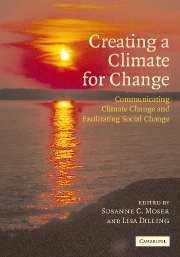Book contents
- Frontmatter
- Contents
- Preface
- Foreword
- List of contributors
- List of tables
- List of figures
- List of text boxes
- Introduction
- Part I Communicating climate change
- Part II Facilitating social change
- 15 Stuck in the slow lane of behavior change? A not-so-superhuman perspective on getting out of our cars
- 16 Consumption behavior and narratives about the good life
- 17 Educating for “intelligent environmental action” in an age of global warming
- 18 Education for global responsibility
- 19 Changing the world one household at a time: Portland's 30-day program to lose 5,000 pounds
- 20 Changing organizational ethics and practices toward climate and environment
- 21 Change in the marketplace: business leadership and communication
- 22 The market as messenger: sending the right signals
- 23 Making it easy: establishing energy efficiency and renewable energy as routine best practice
- 24 Forming networks, enabling leaders, financing action: the Cities for Climate Protection™ campaign
- 25 Ending the piecemeal approach: Santa Monica's comprehensive plan for sustainability
- 26 States leading the way on climate change action: the view from the Northeast
- 27 West Coast Governors' Global Warming Initiative: using regional partnerships to coordinate climate action
- 28 Building social movements
- 29 Climate litigation: shaping public policy and stimulating debate
- 30 The moral and political challenges of climate change
- Part III Creating a climate for change
- About the authors
- Index
- References
26 - States leading the way on climate change action: the view from the Northeast
Published online by Cambridge University Press: 20 August 2009
- Frontmatter
- Contents
- Preface
- Foreword
- List of contributors
- List of tables
- List of figures
- List of text boxes
- Introduction
- Part I Communicating climate change
- Part II Facilitating social change
- 15 Stuck in the slow lane of behavior change? A not-so-superhuman perspective on getting out of our cars
- 16 Consumption behavior and narratives about the good life
- 17 Educating for “intelligent environmental action” in an age of global warming
- 18 Education for global responsibility
- 19 Changing the world one household at a time: Portland's 30-day program to lose 5,000 pounds
- 20 Changing organizational ethics and practices toward climate and environment
- 21 Change in the marketplace: business leadership and communication
- 22 The market as messenger: sending the right signals
- 23 Making it easy: establishing energy efficiency and renewable energy as routine best practice
- 24 Forming networks, enabling leaders, financing action: the Cities for Climate Protection™ campaign
- 25 Ending the piecemeal approach: Santa Monica's comprehensive plan for sustainability
- 26 States leading the way on climate change action: the view from the Northeast
- 27 West Coast Governors' Global Warming Initiative: using regional partnerships to coordinate climate action
- 28 Building social movements
- 29 Climate litigation: shaping public policy and stimulating debate
- 30 The moral and political challenges of climate change
- Part III Creating a climate for change
- About the authors
- Index
- References
Summary
Introduction
As federal climate change policy has failed to keep pace with the need for urgent action, policy-makers across the country, indeed, across the world, increasingly are looking to individual US states for leadership in climate protection. And many states are taking action; more than half of US states and territories have released some form of climate plan. This chapter explores the role of state governments in US climate policy, and particularly the leadership and policy innovation in the Northeast.
While individual states may seem to be too small to make a significant difference in the global effort to curb greenhouse gas (GHG) emissions, even the smallest US state's emission levels are equivalent to those of many countries around the world. Massachusetts, for example, is responsible for only 1.35 percent of the total US GHG emissions (MA State Sustainability Program, 2004; NESCAUM, 2004; US EPA, 2002), yet it emits roughly the same amount of GHGs annually as Chile, Austria, or the Philippines and considerably more than Sweden or Switzerland. In fact, if emissions from all of the states in the Northeast were combined, they would release pollution equal to the eighth largest emitter in the world – more than the entire nation of Canada.
Aside from the direct emissions reductions individual states can make, perhaps most significant is states' role as “policy laboratories” for each other and for eventual federal policy development.
- Type
- Chapter
- Information
- Creating a Climate for ChangeCommunicating Climate Change and Facilitating Social Change, pp. 416 - 430Publisher: Cambridge University PressPrint publication year: 2007
References
- 1
- Cited by



